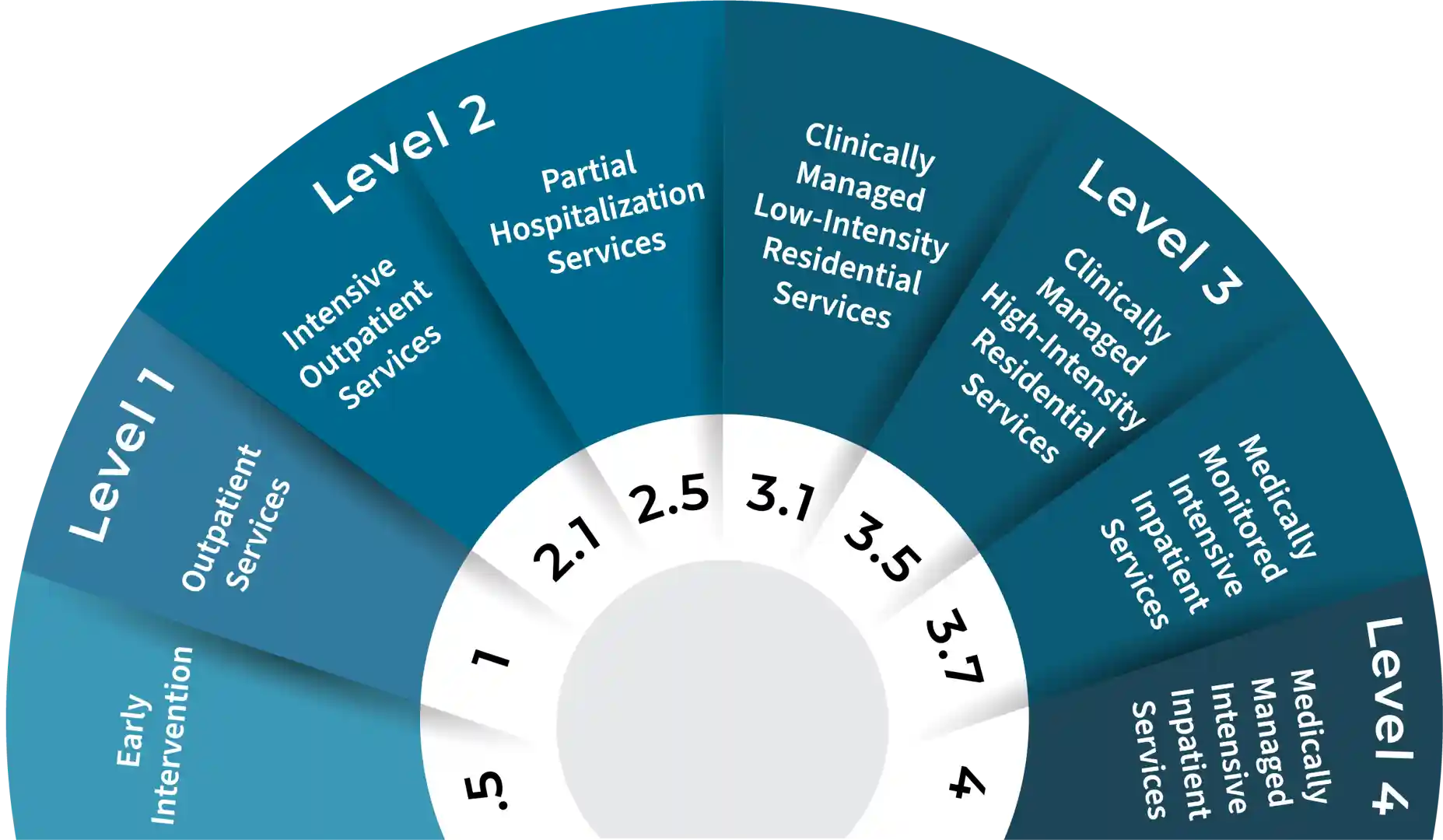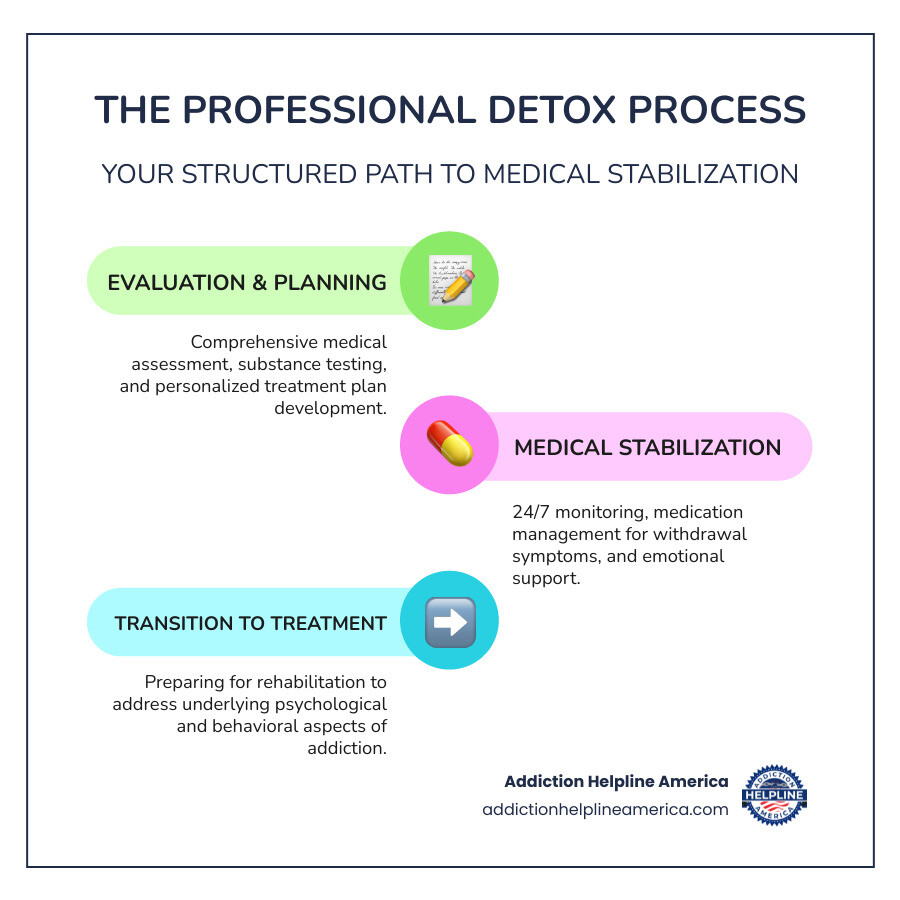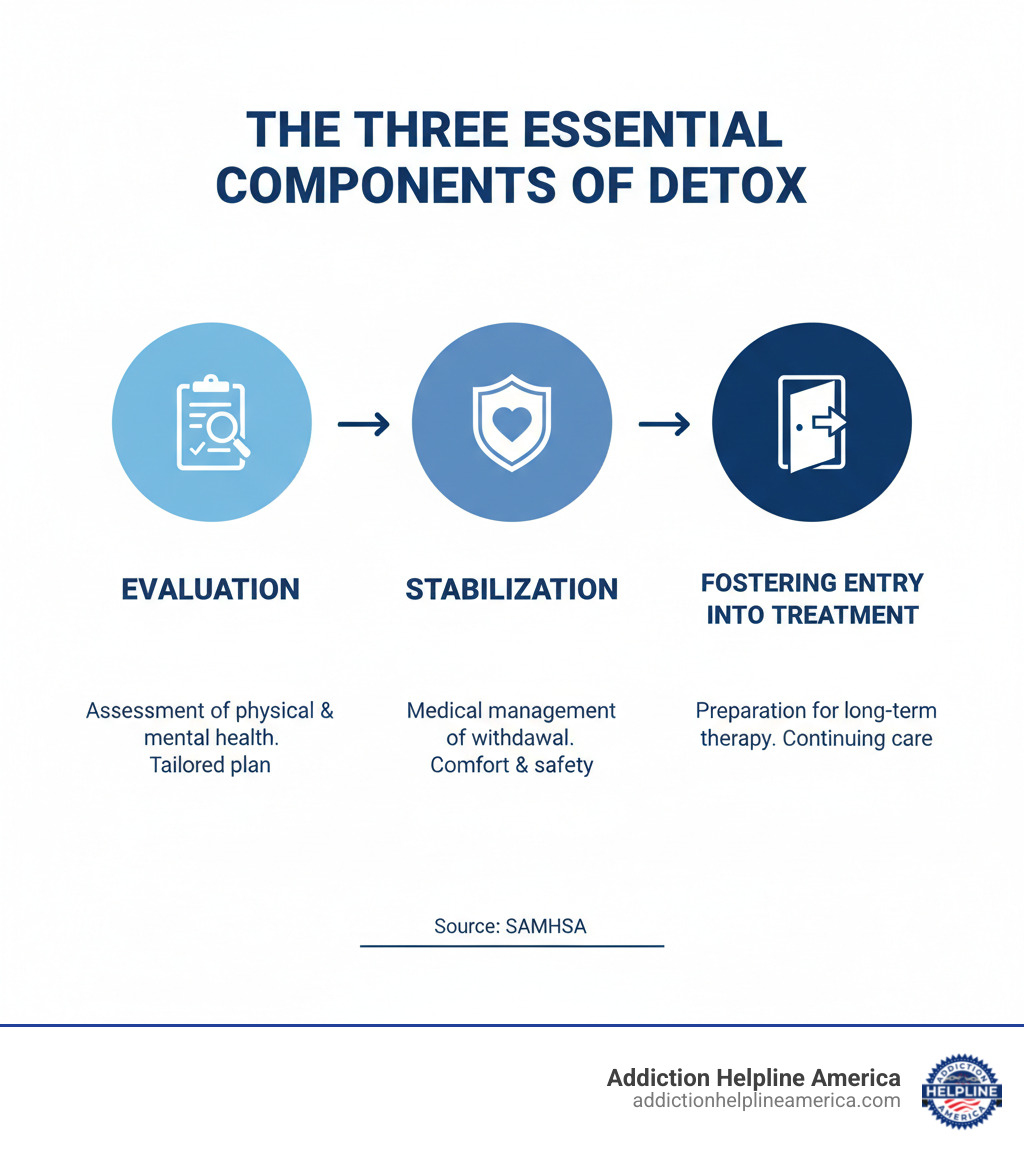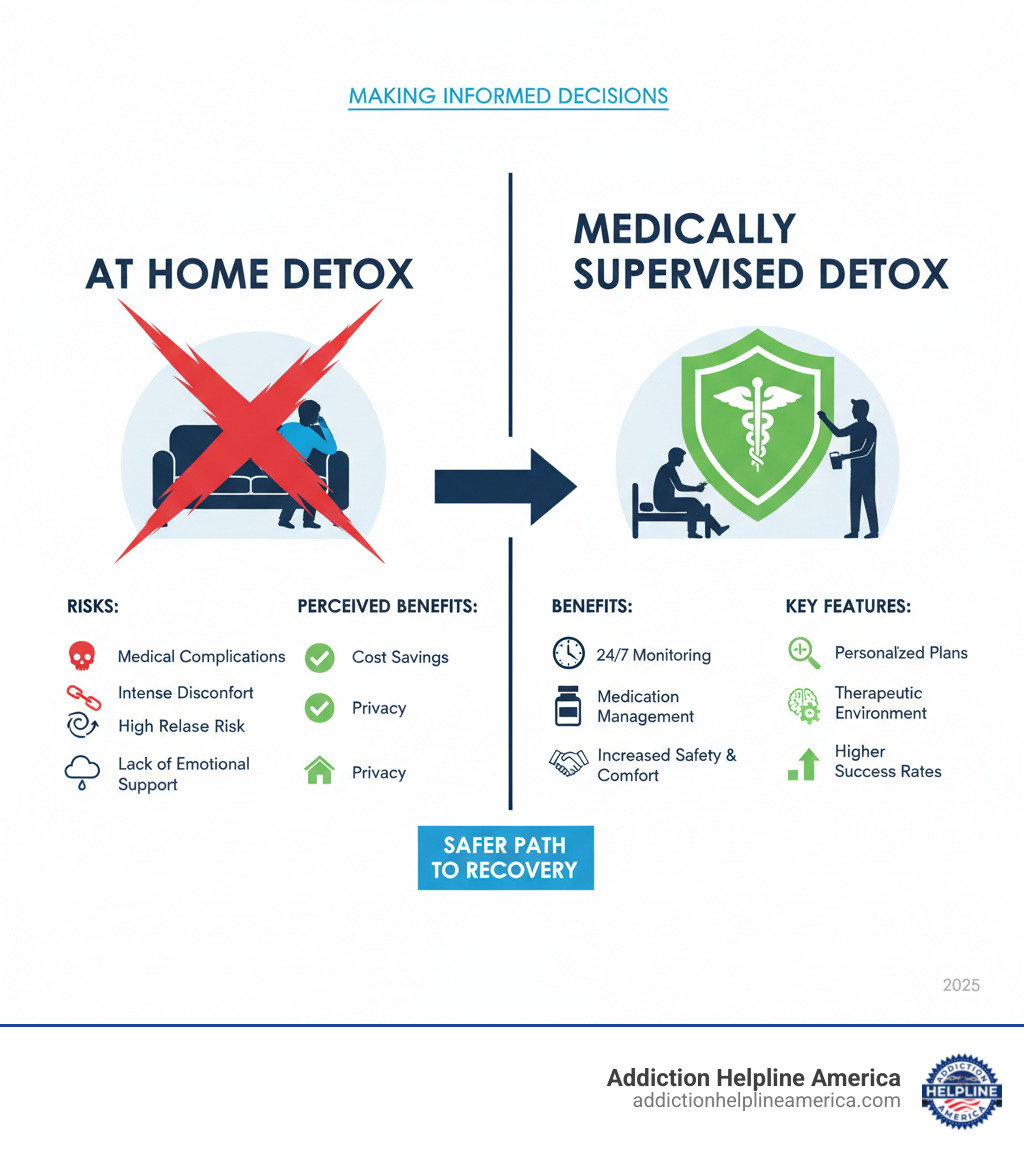
Why Detox Programs Are Essential for Safe Recovery
Detox programs are medically supervised services designed to safely manage withdrawal when someone stops using drugs or alcohol. These programs provide 24/7 medical care, medications to ease symptoms, and emotional support during the first days of recovery. Typically lasting 3-10 days, their purpose is to clear substances from the body and achieve medical stability.
For many substances—especially alcohol, opioids, and benzodiazepines—withdrawal can be dangerous or even life-threatening without professional care. Attempting to detox at home can lead to severe complications like seizures or delirium tremens. Professional programs provide the monitoring and medication needed to manage these risks safely.
It’s critical to understand that detox is not a complete treatment for addiction. Detox addresses the physical dependence, while rehabilitation addresses the psychological aspects. Think of detox as the first step that stabilizes you for the deeper therapeutic work of rehab, which is necessary for long-term recovery.
At Addiction Helpline America, we help individuals and families find the right detox program for their unique needs. Our specialists know that choosing the right program is a critical first step toward lasting recovery.

Quick detox programs definitions:
Understanding Detoxification: The First Step to Recovery
When you’re ready to stop substance use, detoxification is where the journey begins. It’s not a cure for addiction, but rather a process of medical stabilization. When your body is physically dependent on drugs or alcohol, stopping suddenly triggers withdrawal. Detox programs provide the medical care needed to safely manage this process, clear toxins from the body, and prepare you for therapy.
According to SAMHSA, detox is not designed to resolve the psychological, social, and behavioral problems associated with addiction. That’s where rehabilitation comes in.
Call Now – Your Journey to Recovery Begins Today!

Take the first step towards a healthier life! Call now to connect with our compassionate team and start your recovery journey today. Your path to healing awaits!
Our recovery specialists are available 24/7 to provide support, and all calls are confidential and free. Reach out anytime – we’re here to help!
What is the Difference Between Detox and Rehabilitation?
Detox and rehab are both essential but serve different purposes.
Detoxification focuses on the physical side of addiction. This short-term process (typically 3-10 days) is dedicated to managing withdrawal symptoms and ensuring medical safety. A medical team monitors vital signs and administers medications to ease discomfort and prevent complications like seizures.
Rehabilitation addresses the psychological addiction. This longer-term process involves behavioral therapy, counseling, and group support to help you learn coping skills, identify triggers, and develop strategies to prevent relapse. Rehab helps you understand why you used substances and teaches you how to live without them.
The Three Essential Components of Detox
Professional detox programs follow a structured, three-part approach:
- Evaluation: Upon arrival, a medical team conducts a thorough assessment of your physical and mental health. They screen for substance use history, co-occurring medical conditions, and mental health issues to create a personalized treatment plan.
- Stabilization: This is the core of detox, where you are guided through withdrawal to a medically stable, substance-free state. Staff monitor your vital signs, provide medications to manage symptoms, and offer 24/7 emotional support.
- Fostering entry into treatment: As you stabilize, the staff prepares you for the next phase of recovery. They explain the importance of continued care and help connect you with an appropriate rehabilitation program to address the root causes of addiction.

At Addiction Helpline America, we know this first step can feel overwhelming. Understanding what detox involves—and what comes next—can make the journey more manageable. You don’t have to figure this out alone.
Managing Withdrawal: Symptoms and Medical Support
Withdrawal symptoms vary depending on the substance, duration of use, and your overall health, which is why professional supervision is crucial. The timeline is not one-size-fits-all; alcohol withdrawal may peak within a week, while benzodiazepine detox can take longer. Detox programs provide medical teams who know what to expect.

Withdrawal involves both physical and psychological symptoms. Physical symptoms can range from flu-like discomfort (nausea, body aches, sweating) to dangerous complications like seizures. Psychological symptoms often include anxiety, depression, irritability, insomnia, and intense cravings.
Different substances produce different withdrawal experiences:
- Alcohol withdrawal is one of the most dangerous. It can cause seizures and delirium tremens (DTs), a life-threatening condition with severe confusion and hallucinations. Medical detox is essential.
- Opioid withdrawal is uncomfortable, with severe muscle aches and flu-like symptoms that make relapse common. Professional support significantly increases the chance of success.
- Benzodiazepine withdrawal can be prolonged and dangerous, with risks of seizures and psychosis. A gradual, medically supervised tapering schedule is required.
Call Now – Your Journey to Recovery Begins Today!

Take the first step towards a healthier life! Call now to connect with our compassionate team and start your recovery journey today. Your path to healing awaits!
Our recovery specialists are available 24/7 to provide support, and all calls are confidential and free. Reach out anytime – we’re here to help!
The Role of Medication in the Detoxification Process
Medication-Assisted Treatment (MAT) makes detox safer and more bearable. Medications are used to relieve symptoms, prevent complications like seizures, and reduce cravings.
- Buprenorphine is often used for opioid withdrawal to reduce cravings and ease symptoms.
- Naltrexone can help reduce cravings for both alcohol and opioids, often as part of a long-term recovery plan.
- For benzodiazepine dependence, a medically supervised tapering schedule is the standard of care to safely and gradually reduce the dosage.
The Substance Abuse and Mental Health Services Administration (SAMHSA) provides comprehensive information on detoxification and substance abuse treatment if you’d like to learn more.
Common Withdrawal Symptoms to Expect
Knowing what to expect can reduce anxiety. Common symptoms managed in professional detox programs include:
- Anxiety and mood swings: Pervasive unease, irritability, and emotional volatility are common as your brain chemistry rebalances.
- Nausea and body aches: Flu-like symptoms, stomach cramps, and muscle pain are frequent.
- Insomnia: Difficulty sleeping is frustrating but a normal part of the process.
- Intense cravings: Powerful urges to use again are expected and can be managed with support and medication.
- Seizures and Delirium Tremens (DTs): These are the most serious risks, particularly with alcohol and benzodiazepine withdrawal, and require immediate medical intervention. This is why 24/7 monitoring is critical.
What Are the Different Types of Detox Programs?
The right detox program depends on your specific situation, including the substance used, severity of addiction, and your home environment. There is no one-size-fits-all answer.
- Inpatient detox provides 24/7 care in a residential facility. It is the safest choice for severe addiction, complex medical or mental health conditions, or an unsupportive home environment. You receive constant medical supervision in a structured setting.
- Outpatient detox allows you to live at home while attending a clinic for regular check-ins. This option works for less severe addiction and requires a stable, supportive home and strong personal commitment.
- Hospital-based programs offer the highest level of medical care within a hospital unit. This setting is necessary for individuals with serious health complications or a history of severe withdrawal reactions.
- Standalone residential facilities are dedicated detox programs that feel less clinical than a hospital but still provide 24/7 medical staffing and a comfortable, supportive environment.
Our team at Addiction Helpline America can help you determine which setting is most appropriate for your needs.
Medical Detox vs. Social Detox Programs
There are two main approaches to detox:
Medical detox, which we strongly recommend, involves a full medical team providing 24/7 supervision and using medications to manage symptoms and prevent complications. This model treats withdrawal as a serious medical event requiring professional care.
The social model relies on peer support in a non-medical setting, often without medication. While peer support is vital in recovery, this model alone carries significant risks for acute withdrawal from substances like alcohol, opioids, or benzodiazepines.
Today, the best programs blend medical supervision with a compassionate, peer-supported environment.
How to Choose Between Different Detox Programs
When our specialists help you choose a detox program, we consider several critical factors:
- Severity of addiction: Heavy, long-term use often requires inpatient medical detox for safety.
- Type of substance: Alcohol and benzodiazepine withdrawal can be life-threatening and demand medical supervision.
- Co-occurring disorders: If you have a mental health condition like depression or anxiety, you need a program that can treat both issues simultaneously.
- Physical health status: Chronic health conditions like heart or liver disease can complicate withdrawal and require close medical monitoring.
- Previous treatment history: Understanding what has or hasn’t worked before helps us recommend a more effective approach.
Call Now – Your Journey to Recovery Begins Today!

Take the first step towards a healthier life! Call now to connect with our compassionate team and start your recovery journey today. Your path to healing awaits!
Our recovery specialists are available 24/7 to provide support, and all calls are confidential and free. Reach out anytime – we’re here to help!
The Dangers of Detoxing at Home vs. The Benefits of Professional Care
Attempting to detox at home without medical supervision is extremely risky. Quitting “cold turkey” can be a gamble with your life, especially with substances like alcohol and benzodiazepines, where withdrawal can turn dangerous within hours.

Risks of at-home detox include seizures, dangerous spikes in heart rate and blood pressure, and life-threatening delirium tremens. Even with less physically dangerous withdrawals, like from opioids, the misery and intense cravings make relapse highly likely, increasing the risk of an overdose.
Professional detox programs eliminate these dangers. You are surrounded by a medical team that monitors your vital signs, administers medications to manage symptoms safely, and provides emotional support. This controlled environment allows you to focus entirely on getting through withdrawal safely and comfortably.
We’ve seen countless individuals succeed with professional care after failed attempts at home. The difference is not willpower—it’s having the right medical resources and support.

Why Rapid Detox Is Not Recommended
You may have heard of “rapid detox” programs that use general anesthesia to speed through withdrawal. These procedures sound appealing but are not recommended due to severe risks.
- High Medical Risk: Rapid detox carries a risk of serious complications, including heart attack, infections, and even death. Approximately one in 500 people who undergo this procedure dies from complications.
- High Cost: These programs can cost $10,000 or more and are typically not covered by insurance because they are considered experimental and unsafe.
- Poor Outcomes: Research shows rapid detox does not improve long-term sobriety rates. It bypasses the crucial mental adjustment period of traditional detox and fails to prepare individuals for ongoing recovery.
There are no shortcuts in recovery. Medically supervised detox provides the time your body needs to adjust safely, without the extreme risks of rapid detox.
How to Find and Pay for a Reputable Detox Center
Finding the right detox program can feel daunting, but you don’t have to do it alone. At Addiction Helpline America, we connect people nationwide with quality detox centers.
When searching, prioritize facilities with proper licensing and accreditation. A center should be licensed by its state and ideally accredited by national bodies like The Joint Commission or CARF, which indicates high standards for safety and care. Also, ensure the staff is qualified, including licensed medical doctors, nurses, and addiction specialists.
Crucially, a quality facility will have a clear plan for aftercare. Detox is only the beginning, and the center should be focused on helping you transition to the next level of care, such as rehabilitation or therapy.
If you need help finding facilities, the SAMHSA National Helpline at 1-800-662-HELP (4357) offers confidential referrals.
Questions to Ask a Detox Facility
When contacting potential detox programs, ask these key questions:
- Is the facility licensed and accredited?
- What are the credentials of the medical staff (doctors, nurses, therapists)?
- What is your treatment approach, and do you use medication-assisted treatment?
- What is the typical program length?
- What payment options do you accept, and can you verify my insurance?
- Do you treat co-occurring mental health disorders?
- What does your aftercare planning and support involve?
Understanding the Costs and Payment Options
Cost is a major concern, but it shouldn’t be a barrier to getting help. The price of detox programs varies, but many payment options exist.
- Insurance: Most reputable centers accept health insurance, and many plans cover detoxification services. We can help you verify your benefits.
- Medicaid/Medicare: These government programs are accepted at numerous facilities for eligible individuals.
- Private Pay and Sliding Scale: For those without insurance, facilities accept private payment, and some offer sliding scale fees based on income.
- Free Programs: State-funded or non-profit organizations may offer free programs for those who qualify.
Our team can help you explore these options to find a program that fits your needs and budget. Find a treatment facility with Addiction Helpline America
Life After Detox: Continuing the Recovery Journey
Completing detox is a huge achievement, but it is not a cure for addiction. It is the first step that clears your body of substances and provides medical stability. The real work of recovery—healing emotionally and building a new life—begins after detox.
Detox removes physical dependence but doesn’t address the underlying causes of substance use. This is why a continuum of care is critical. Individuals who complete detox but do not continue with further treatment are at an extremely high risk of relapse. After leaving a detox program, you will typically transition to one of the following:
- Inpatient Rehabilitation: Live-in treatment, typically for 30-90 days, offering intensive therapy in a structured, supportive environment away from triggers.
- Partial Hospitalization Programs (PHP): Attend treatment for several hours daily, five to seven days a week, while living at home or in sober housing.
- Intensive Outpatient Programs (IOP): Attend therapy sessions for a few hours, three to five days a week, offering flexibility for work or family obligations.
- Sober Living Homes: A supportive, substance-free residential environment that bridges the gap between treatment and independent living.

The Importance of Aftercare for Relapse Prevention
Aftercare is your safety net for long-term recovery. Addiction is a chronic condition that requires ongoing management. Relapse is not a sign of failure but an indication that your treatment plan may need adjustment.
Effective aftercare is built on several key components:
- Behavioral Therapy: Cognitive Behavioral Therapy (CBT) and Dialectical Behavior Therapy (DBT) help you change negative thought patterns and develop skills for managing emotions and stress.
- Individual Counseling: A confidential space to work through personal issues like trauma, grief, or co-occurring mental health conditions with a therapist.
- Support Groups: Peer-led groups like Alcoholics Anonymous (AA), Narcotics Anonymous (NA), or SMART Recovery provide encouragement, accountability, and a sense of community.
- Building Coping Skills: Learning healthy ways to handle stress, communicate effectively, and process difficult emotions without substances.
- Creating a Sober Support Network: Surrounding yourself with supportive family, friends, and mentors who encourage your recovery.
At Addiction Helpline America, we connect you with comprehensive care that addresses the whole person, helping you build a productive, fulfilling life in recovery.
Call Now – Your Journey to Recovery Begins Today!

Take the first step towards a healthier life! Call now to connect with our compassionate team and start your recovery journey today. Your path to healing awaits!
Our recovery specialists are available 24/7 to provide support, and all calls are confidential and free. Reach out anytime – we’re here to help!
Your Path to Recovery Starts Here
Taking the first step toward recovery takes tremendous courage. If you’re reading this, you’ve already begun that journey, and we want you to know you’re not alone.
Detox programs provide the critical, medically supervised foundation for a safe recovery. With professional care, you can steer withdrawal safely and comfortably, monitored by compassionate experts who understand what you’re going through.
Detoxification is just the beginning. It stabilizes your body and prepares you for the deeper work of rehabilitation and therapy, which is essential for lasting success. Recovery is absolutely possible for everyone, regardless of their circumstances.
At Addiction Helpline America, we’re here to walk alongside you. We provide free, confidential guidance to help you find the right detox programs and treatment options from our extensive network. Our specialists consider your unique situation—from medical history to insurance coverage—to connect you with the best possible care.
You don’t have to figure this out on your own. Let us help you find the support you need to take that courageous first step toward a healthier, sober life.
Find the right alcohol or drug addiction treatment program for you
Our helpline is 100%
free & confidential
If you or someone you care about is struggling with drug or alcohol addiction, we can help you explore your recovery options. Don’t face this challenge alone—seek support from us.
Programs
Resources
Will my insurance
cover addiction
treatment?
We're ready to help
Find the best
drug or alcohol treatment
center
Are you or a loved one struggling with addiction? Call today to speak to a treatment expert.















